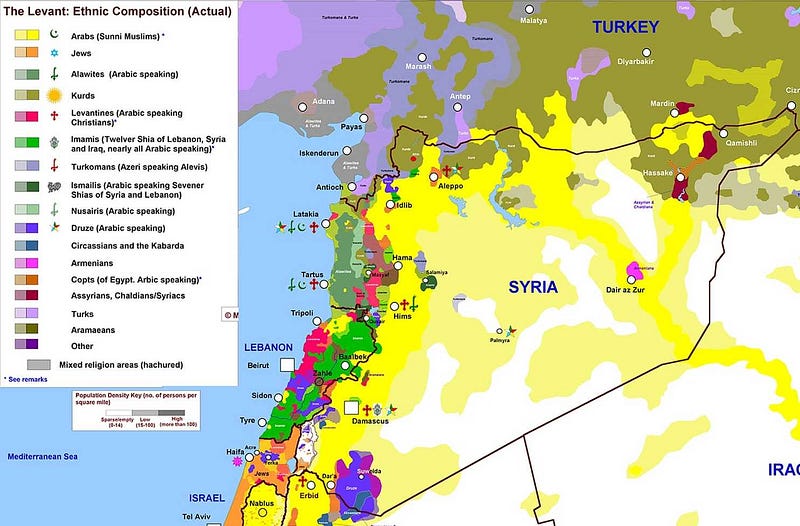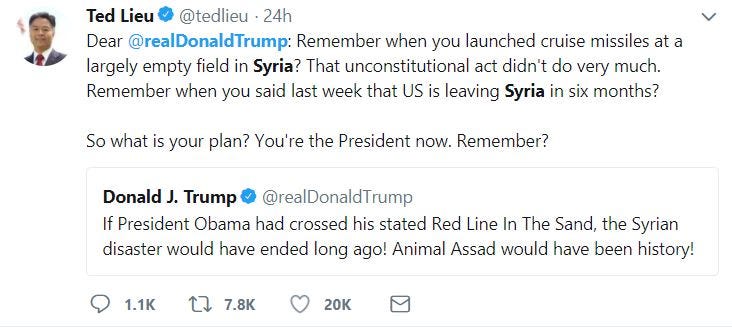By Kent R. Kroeger (April 9, 2018)

News of another chemical weapons attack in Syria, this time in Douma, reminds us of how deep and unresolved that conflict remains.
The Western media have generally been quick to blame the Assad regime for this latest attack, while Assad and the Russians have been equally quick to deny their culpability in this horrendous act that killed at least 70 civilians, mostly women and children.
That the blame has been so quickly assigned to Assad’s regime is predictable and with some merit; however, it is the breadth and ferocity of America’s media and governing elite to also blame Donald Trump for this cruel act that is most troublesome.



In a Washington Post editorial just days before this latest chemical attack, MSNBC’s Joe Scarborough writes: “ That the U.S. president announced his plan to cede Syria to Vladimir Putin had to be deeply unsettling for those three countries, which are under continuous threat from Russia. But they are certainly not alone. America’s friends and foes alike must be asking themselves what kind of country cedes Iraq to Iran in a catastrophic, ill-planned war; abandons that country in 2011 after returning a semblance of order; sits idly by while 500,000 Syrians are slaughtered; allows, through inaction and neglect, for the rise of the Islamic State; and belatedly crushes the Islamic State’s dream of a thousand-year caliphate — only to once again move to abandon the region, thereby empowering the Islamic State, Iran, Russia and the murderous Syrian regime of Bashar al-Assad.”
But the most troubling conclusion Scarborough draws is the following: “After years of endless bloodshed, the U.S. military has finally learned to fight an enemy such as the Islamic State in a way that is successful and sustainable.”
Scarborough’s builds his thesis from the dubious assertion that the defeat of ISIS (at least as a territory-controlling entity) was solely the work of U.S. military strategy and ignoring the fact that, by following Russia’s lead, we stopped fighting a two-pronged war (one against Assad and one against ISIS) and decided to concentrate on the beatable foe, ISIS.
The Washington Post’s David Ignatius takes the war-mongering to an even more cynical level by suggesting it is the ‘feel-good’ thing to do.
“One face of the war in Syria that Americans don’t often see is the U.S. Army trauma surgeon, standing in the midday sun on the outskirts of Raqqa, taking a brief break from her near-constant duty in the operating room treating Syrians whose limbs have been shattered by bombs and booby traps. The doctor is a lieutenant colonel serving with U.S. Special Operations forces,” writes Ignatius about one of his experiences during a four-day trip to Syria in February. “The lieutenant colonel is part of the Syria mission that President Trump seems determined to end. Reflecting on the surgeon and the scores of other U.S. soldiers I’ve met during three trips to Syria since 2016, I can’t help thinking that there’s something about this mission — which has been low cost and high success, according to commanders — that Trump doesn’t understand.”
The U.S. doesn’t fight wars so our troops can feel good about themselves. We fight wars to protect our national interests when they are threatened.
As an extra measure, for any remaining skeptics towards a new U.S. occupation in the Middle East, Ignatius ends with this doughy anecdote: “I’m flying out of Syria on a C-130 cargo plane. Sitting next to me is a young officer who’s upset to be on that flight, for two reasons. He is going home to see his mother, who’s very ill. And he is leaving his comrades on the battlefield before the fight is over. He hates that last idea. So should we all.”
Ignatius should have told the young officer, no need to worry, the war in Syria will never be over. The officer will have plenty of time to rejoin the fight.
A fight that Scarborough and Ignatius both suggest the U.S. has learned how to win.
After almost 17 years of U.S. troops fighting jihadists and anti-Western combatants, have we really discovered the secret sauce necessary to bring peace and stability to Syria and the Middle East in general?
Of course not.
Lt. Col. Daniel L. Davis, USA, Ret., who retired in 2015 after serving in four combat deployments (including Syria) offers boots-on-the-ground experience in the Middle East and concludes that now is not the time for the U.S. to make a bigger troop commitment in Syria.
“Aside from the fact it is militarily impossible to accomplish the laundry-list of goals in Syria — ‘countering’ Iran (which can’t even be defined), opposing Assad (which isn’t necessary for U.S. security), and stopping Turkey from attacking Syrian Kurds (risking confrontation with our NATO ally),” Davis writes in an op-ed essay for CNBC.com. “It is not in America’s interests to stay in Syria for objectives so disconnected from our security and prosperity. Contrary to conventional wisdom in Washington, the strategic benefit doesn’t come anywhere close to justifying the cost.”
Davis also counters the suggestion the U.S. leaving Syria will embolden Russia.
“ Many fear that a U.S. withdrawal from Syria would hand a victory to Russia. That concern is also misplaced. Russia has an enduring interest in Syria in holding on to their sole Middle East warm water port at Tartus,” Davis writes. “ So long as Assad stays in power, they (Russia) will continue to hold it (Tartus), quite irrespective of whether the U.S. remains or withdraws. What Russia wins by the departure of U.S. troops, however, is becoming the primary owner of the Syrian disaster and all the strategic costs that come with it. American power throughout the Middle East remains robust and undiminished, and will continue to dwarf that of Russia even after the small contingent of U.S. troops has returned home.”
Davis finally concludes: “ Syria remains embroiled in a civil war with scores of groups and militias trying to attain various and competing objectives. The remaining fight there belongs to them, not the United States.”
The chemical attack in Douma is tragic and must be addressed by the international community. And should the UN confirm Assad’s role in the attack, there must be an international response that includes holding Russia accountable as well.
A new and larger U.S. occupation force in Syria, however, should not be considered one of the viable options.
K.R.K.
{Send comments to: kkroeger@nuqum.com}
About the author: Kent Kroeger is a writer and statistical consultant with over 30 -years experience measuring and analyzing public opinion for public and private sector clients. He also spent ten years working for the U.S. Department of Defense’s Office of the Under Secretary of Defense for Personnel and Readiness and the Defense Intelligence Agency. He holds a B.S. degree in Journalism/Political Science from The University of Iowa, and an M.A. in Quantitative Methods from Columbia University (New York, NY). He lives in Ewing, New Jersey with his wife and son.
